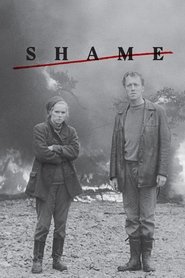In Shame, Bergman scrapes the polite liberal veneer off postwar European life and puts Scandinavian islanders in the position of a colonized people. [Bergman] suggests that their privileged lives were based on civilized routines, not true ideals or principles. At one point, in a tragicomic epiphany, Eva cries out to a squad of enemy troops that she was “first violinist in the philharmonic.” Jan is lost without music—to Eva, to the world, and to himself. It makes poetic sense that a weak heart has kept him out of the war.[…]
In a lovely, lyrical passage about twenty minutes into the film, Jan and Eva eat the fish she has bought from a neighbor, alfresco, and share their desires at the picnic table. […] She wants to learn Italian, and to have a child, believing a baby will solve their problems. (She leaves unsaid that doing so would also prove their faith in the future.) Jan thinks they should wait, and stay in practice as musicians. […] We see how this couple might have thrived in a peaceful life. Their rapport is easy, their postures conspiratorial, their faces alive with possibility. All of that will disappear as they run the gauntlet of gunpoint interrogations and impromptu showdowns to come.
[…]
Throughout, Bergman gets us to feel what it’s like to be a displaced person in one’s own homeland. […] With heartbreaking persuasiveness, Ullmann takes her character from youthful ardor to soul-shriveling despair and resignation. It’s wrenching to see Jan bullying her into submission with his newfound, cynical machismo.
— Michael Sragow (Criterion)
Though stark and despairing, Ingmar Bergman’s films are essentially […] celebrations of art in which erudite characters wrestle with their demons via their creative endeavors. […] Bergman’s films are catnip to cinephiles, critics, and theatergoers partially because they inevitably flatter such audiences, offering tortured artists of physical majesty whose struggles […] often suggest nothing less than the great existential plight of humankind. In this light, it’s doesn’t feel coincidental that Bergman’s less acclaimed films tend to interrogate the foundation on which he’s built this reflexively flattering art.[…]
Eva and Jan’s home, a synecdoche for this society and their imperiled relationship, is bombed and raided many times, leaving them to start over amid rubble while they castigate one another. Through it all, they compromise themselves over and over, and Jan, initially a coward, becomes a wolf. Which is to say that Bergman has staged a brutal lament of the impotency of war as it’s felt among the populace at its mercy
— Chuck Bowen (Slant Magazine)
Shame was named best film of the year by the National Society of Film Critics, but is not much talked about 40 years later--certainly not in comparison with Persona. It might have made a greater impact if he'd made it specifically about Vietnam, but I believe he was unhappy that Persona had been decoded by critics as being against that war, all because of one image; it was about, and against, a great deal more.

